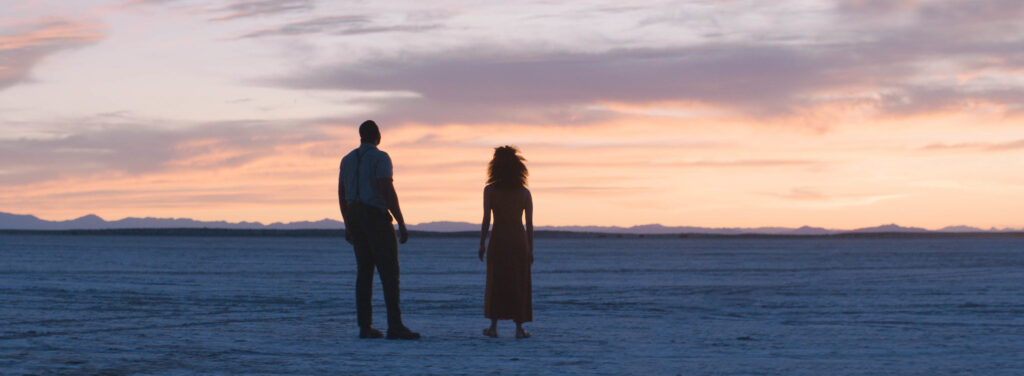Sundance Review: Nine Days
Written by Ian Thomas Malone, Posted in Blog, Movie Reviews, Pop Culture
Art is the thing that sets humanity apart from all other forms of life. To feel is to be human, or so they say. There’s a reason most films avoid mundane boring stuff, like spending an hour at the grocery store or filing one’s taxes. Film exists to make us feel.
Nine Days is a film about life itself, set in a remote house in a plane of existence that’s not quite heaven but sure isn’t earth either. The setting is sort of like a purgatory for spirits who haven’t been born. Will (Winston Duke) sits in his house watching a collection of old TVs displaying various people living their lives. The aesthetics are firmly rooted in the 20th century, with VHS tapes being the most modern form of technology.
Will is tasked with interviewing several candidates for the position of being born. These entities are essential pre-humans, though it’s hard to call them souls as they don’t know what it’s like to be alive. Will was once alive, now tasked with judging who would be best suited to follow him over the course of nine days.
Director Edson Oda presents a quiet, contemplative narrative. There’s plenty of humor, mostly coming from Kyo (Benedict Wong), Will’s caretaker/spirit/friend. Kyo has never been born, but Wong plays him with such a compassionate sense of curiosity that he certainly feels like someone who could pass for human. As one of the candidates named Alexander, Tony Hale provides a lot of comic relief, often serving as a conduit for the audience in asking questions of Will’s methodology that are bound to be on everyone’s mind.
Duke is absolutely fabulous in the lead role. Will is a reserved man who’s clearly been through a lot that he doesn’t want to talk about. He’s well-suited for his job because he understands the brutal nature of life and what he takes to make it in the world. Duke plays Will with a quiet intensity, understanding the value of restraint with his character’s emotions.
Will’s relationship with Emma (Zazie Beetz) anchors the narrative. Emma isn’t like the other candidates. She’s free-willed, hungry for something more than just sitting around watching screens of other people’s lives. Beetz brings a childlike sense of wonder to the character, a maturity well-beyond the few days that Emma has been alive.
Oda keeps his cards close to his hands with regard to the mechanics of this strange place. We learn very little about how Will’s world works, where Kyo came from, or the powers-that-be that created this place. It’s a mystery that’s always present, but not one that ever feels like it needs to be answered. The triumph of the film lies in the simplicity of Oda’s approach. The premise doesn’t need a whole lot of exposition to make sense.
The pacing works very well. It’s a quiet narrative with a single setting, but the two hour runtime flies by. There are a bunch of candidates, but Oda juggles the pieces in a way that makes picks favorites without making the rest feel like filler. The narrative tackles the preciousness of life with grace, with several tear-jerking moments that demonstrate beauty in relatively mundane events. For a film as quiet and relaxed as Nine Days, there’s never any point where the narrative drags.
Nine Days is one of the most moving films of the twenty-first century. Few narratives so confidently capture the feeling of being alive. It is very hard to believe that this is Oda’s first film.











